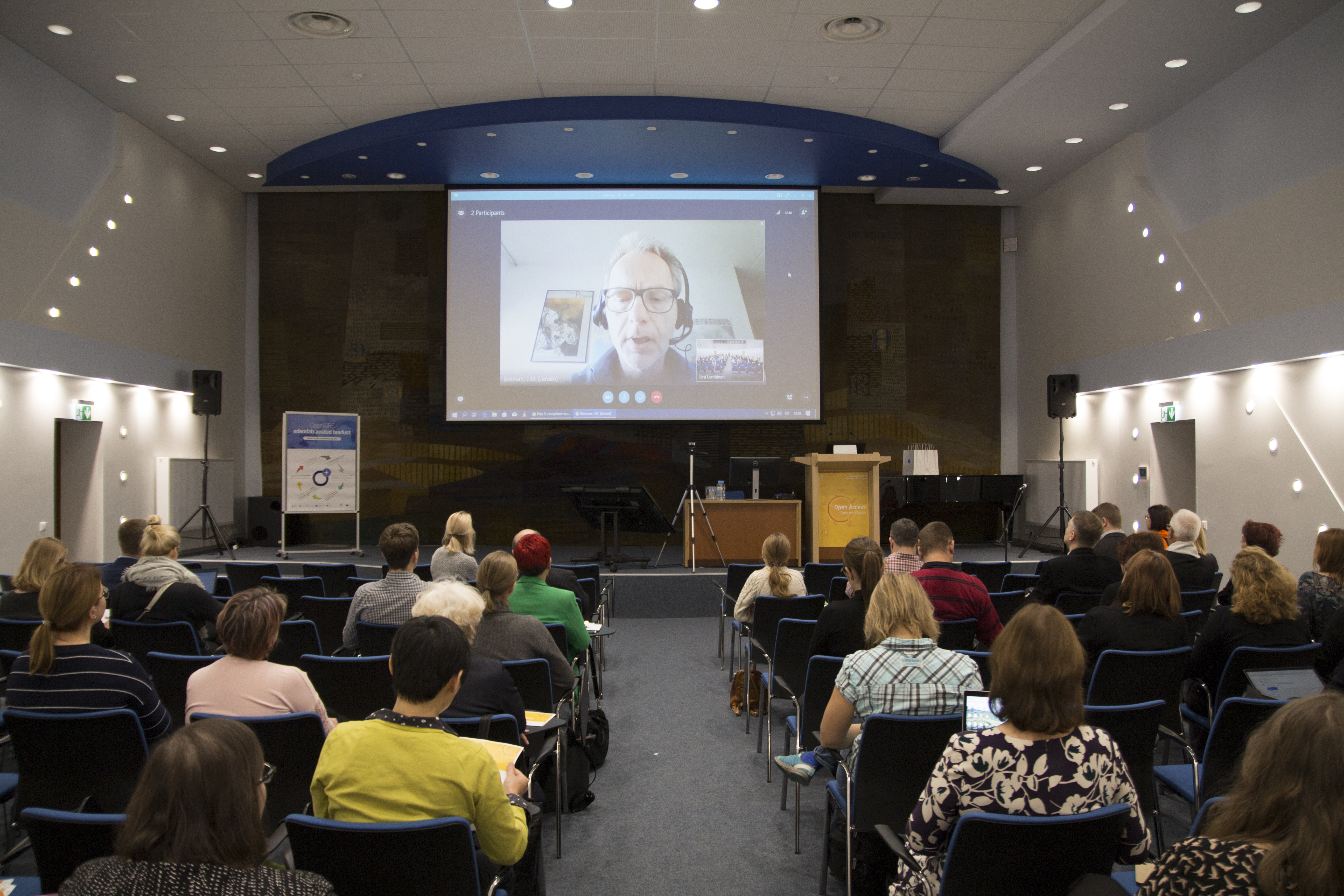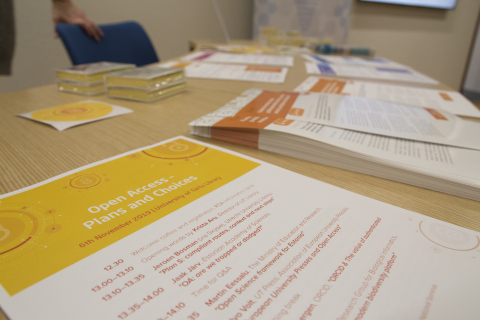OpenAIRE National Event in Estonia
The University of Tartu Library organized an annual OpenAIRE National Event in Tartu on the 6th of November. Focus of the seminar was on the future of Open Access. Various initiatives which contribute to the future of Open Access were included like Plan S, new Open Access publishing, Estonian route to Open Science policy and ORCID. Over 80 people attended the event.
Keynote speaker of the event was Jeroen Bosman who is a Research Librarian of the Utrecht University Library and Open Access researchers. His presentation focused on the importance of Plan S. He gave a background and wider policy context on Plan S and brought out the main characteristics of the Plan S and its compliance of publications. He also brought out how publishers and researchers can increase their compliance with Plan S as well as suggestions for institutions and libraries considering (reconsidering) institutional OS policies; negotiating transformative agreements with publishers, investing in common infrastructure, developing institutional OA publication platforms; making institutional repositories Plan S compliant; informing and supporting researchers.
Jaak Järv, representative of the Academy of Sciences in Estonia and a researcher presented his views on Open Access in an interesting presentation called "OA: are we trapped or dodged?". He brought out how massive publishers have grown so large that there is not a single library that can ever afford the entire set of publications. He described research tri-polar model: scientists, publishers and Jacs-in-office who hold access to scientometric data. He claimed that the bureaucracy is supporting the publishing system where scientists are sold their own scientific product. He concluded that the bureaucratic part of the model is influencing science by requiring Open Access. He brought out the paywall crossing problem – if Plan S and Open Access want to survive, we need to have a great plan how to overcome this paywall. He admitted that he supports Open Access; however, is worried how to make it survive.
The Estonian Ministry of Education and Research's representative Martin Eessalu presented the Estonian Open Science Framework. He started with the current state of Open Science in Estonia. Mandatory green OA for publications in personal grants and DMP recommendation which does not mean that the data needs to be opened up. Currently, there are no policy with exceptions, except two language-related R&D programs. Relevant infrastructure: ETAIS (national HPC competence center) and NATARC for life sciences.
"Open Science makes scientific results available to society, enterprises and researchers."
Main principle of the Open Science Framework for Estonia
The Open Science Framework for Estonia - Policy framework covers all relevant aspects of Open Science (access to publications, data, communication and skills, infrastructure, evaluation of research). The framework will be annex to development plan for research, development, innovation and entrepreneurship (2021-2035). This document is based in many internal and external policy recommendations and studies.
The main principle – Open Science makes scientific results available to society, enterprises and researchers. OS is a horizontal value and practice through the Estonian R&D system and needs to be takin into account in science communication, research evaluation, funding decisions and ensuring access to scientific information.
Estonian Open Science planned governance – Ministry of Education and Research – responsible for the overall governance, Estonian Research Council – coordination of reaching the OS goals. Stakeholder consultations will start before end of the 2019 already. –
Ivo Volt from the University of Tartu Press introduced the work of Association of European University Presses. Small presses brought together to share their knowledge and have a common voice. They have no OA mandate to become a member but strong support of OA. AEUP doesn't have common policy towards OA because they are so dependent on home institution who are dependent on national policies. Mostly monograph publishers are in AEUP. Current problems: lacking national standards on OA and Plan S is unclear on monographs. Journal business has been taken over by large publishers. OA as one of the priorities declared by the Publishing Committee of the University of Tartu, all UT Press published journals all OA (diamond OA – no APCs - neither the researcher or reader pays, costs covered mainly by the university).
ORCID representative Ivo Wijnbergen introduced ORCID activities, vision, registry and standard procedures – an international-scale open research effort. ORCID allows to remove uncertainty because it is an organization which has made a promise to keep persistent identifiers alive and is globally unique string.. PIDs are for journal articles (crossref.org), people (ORCID), data, software (datacite.org), research organizations (ror.org). ORCID helps to increase visibility. Allan Zirk from the Museum of Natural History of the University of Tartu, introduced the PlutoF data management platform which was just integrated with ORCID as a first stage.

Open Access – Plans and Choices 2019
When you subscribe to the blog, we will send you an e-mail when there are new updates on the site so you wouldn't miss them.
About the author

funding from the European
Union's Horizon 2020 Research and
Innovation programme under Grant
Agreement No. 777541.



Comments